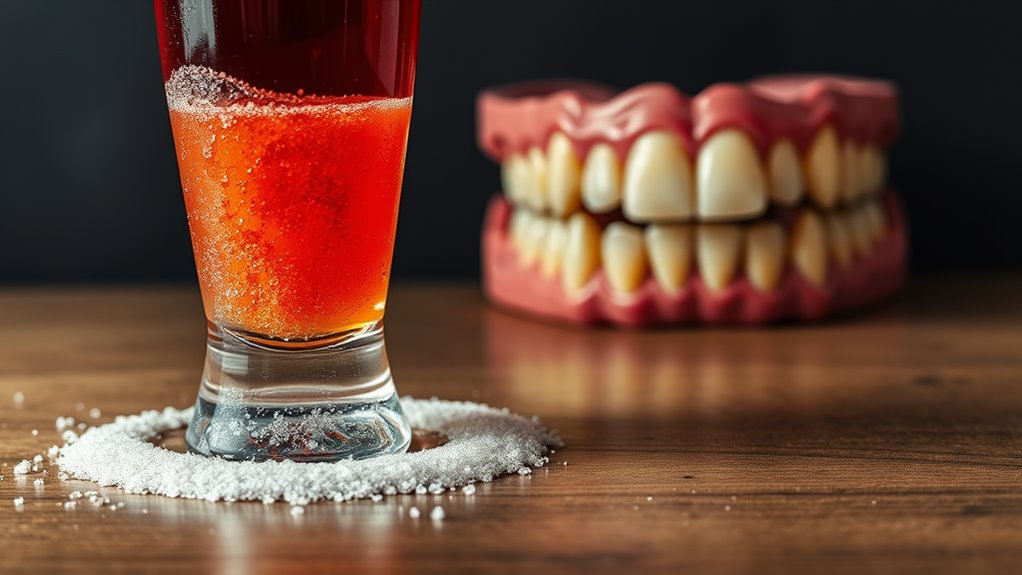The Mineral Your Teeth Need (And You Might Be Missing)
Key Takeaways
- Calcium is essential for building and maintaining strong tooth structure and preventing decay.
- A deficiency in calcium can lead to symptoms like cracked teeth and frequent cavities.
- Dairy products, leafy greens, and legumes serve as excellent dietary sources of calcium.
- Vitamin D enhances calcium absorption, making it crucial for oral health.
- Incorporating calcium-rich foods into your diet supports both enamel strength and gum health.
The Importance of Minerals for Dental Health
Minerals play an essential role in maintaining your dental health. They help prevent decay and support tooth strength, calcium necessary for robust teeth. Key minerals like phosphorus and magnesium contribute to enamel formation and repair, ensuring your teeth remain resilient against wear and tear.
Meet Your Teeth’s Best Friend: Calcium
Calcium is an essential mineral that serves as your teeth’s best friend, playing a key role in keeping them strong and healthy.
It helps in building and maintaining your tooth structure, ensuring your enamel’s integrity. Adequate calcium intake supports the prevention of tooth decay and promotes overall oral health. Additionally, calcium works in tandem with Vitamin D to enhance its absorption and maximize its benefits for your dental health.
How Calcium Supports Tooth Strength
While you may not always think about it, the strength of your teeth heavily relies on calcium.
This essential mineral helps form and maintain your tooth enamel, the hard outer layer that protects against decay and sensitivity. Adequate calcium intake supports the overall structure of your teeth, ensuring they remain strong and resilient against daily wear and tear, and promoting ideal oral health. Additionally, sufficient levels of Vitamin D are necessary for optimal calcium absorption, further enhancing your dental strength.
Signs You May Be Lacking Calcium
If you’re experiencing cracked teeth, frequent cavities, or noticeable gum health issues, it could indicate a calcium deficiency.
These signs not only affect your oral health but can also impact your overall wellbeing. Incorporating calcium-rich foods into your diet can help support stronger teeth and prevent these issues.
Recognizing these symptoms early can help you take appropriate action to maintain your dental and general health.
Cracked Teeth Diagnosis
Have you noticed any sudden discomfort or visible cracks in your teeth?
These signs may indicate a calcium deficiency, weakening your tooth structure. Pay attention to any sensitivity when chewing or temperature changes.
Cracked teeth can lead to further complications if not addressed. Regular dental check-ups and monitoring are essential to maintain your oral health and make certain you’re getting enough calcium.
Frequent Cavities Concern
Are you finding yourself visiting the dentist more often for cavities?
This frequent occurrence could indicate a calcium deficiency. Calcium plays an essential role in maintaining strong tooth enamel and preventing decay.
You might also notice increased sensitivity or weakened teeth. If you’re experiencing these signs, consider evaluating your diet and discussing potential supplementation with your healthcare provider to improve your oral health.
Gum Health Warning Signs
Frequent visits to the dentist for cavities often go hand in hand with other oral health concerns, such as gum issues.
If you notice swollen, red, or bleeding gums, it may signal a calcium deficiency. Additionally, persistent bad breath or gum recession can indicate weakened gum health.
Recognizing these signs early can help you address potential calcium shortages and improve your overall oral health.
Dietary Sources of Calcium
To maintain strong teeth, it’s essential to incorporate adequate calcium into your diet.
Dairy products like milk, cheese, and yogurt are well-known sources, but there are also plenty of plant-based options available.
Exploring these dietary sources can help you meet your calcium needs effectively.
Dairy Products Overview
While many foods contribute to your calcium intake, dairy products stand out as one of the most reliable sources.
Milk, cheese, and yogurt offer not only high calcium content but also essential nutrients like protein and vitamin D.
Incorporating these items into your diet can help you maintain strong teeth and bones, ensuring you meet your daily calcium requirements effectively.
Plant-Based Sources
Have you considered how many plant-based sources can boost your calcium intake?
Leafy greens like kale and bok choy, legumes such as beans and chickpeas, and fortified plant milks are excellent options.
Nuts and seeds, especially almonds and sesame seeds, also provide significant calcium.
Incorporating these foods into your diet can help guarantee you meet your calcium needs for stronger teeth and bones.
Tips for Increasing Calcium Intake
Increasing your calcium intake is essential for maintaining strong teeth and overall bone health.
You can easily boost your calcium levels by incorporating a few simple strategies into your diet:
- Enjoy dairy products like yogurt and cheese.
- Add leafy greens, such as kale and spinach, to your meals.
- Snack on almonds or sesame seeds.
- Consider fortified foods or supplements if needed.
Moreover, including leafy greens in your diet also provides essential minerals that strengthen enamel and promote gum health.
The Impact of Calcium on Overall Health
Calcium plays an essential role in your overall health, far beyond just strengthening your teeth and bones.
It aids muscle function, regulates heart rhythms, and supports nerve transmission. Insufficient calcium intake can lead to muscle cramps, osteoporosis, and cardiovascular issues.




